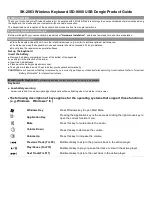
108
Tyros5 Reference Manual
Overview Tab Parameters
HARMONY ASSIGN
For detailed information on each parameter, refer to the Data List (Vocal Harmony Parameter List) on the website.
[A]
MODE
Determines the mode of the Vocal Harmony effect: Chordal, Vocoder or Vocoder-
Mono. Chordal is for conventional vocal harmonies, while Vocoder and Vocoder-
Mono are for Vocoder effects. (Vocoder-Mono is for single-note melodies.) When
Vocoder or Vocoder-Mono is selected, the Chordal Type parameter below is not
available.
[B]/[C]
CHORDAL TYPE
Determines the particular notes and voicings used for generating the vocal harmo-
nies. The harmony and lead notes are also shown as notation in the display. For a
list of the Chordal Types, refer to the Data List (Vocal Harmony Parameter List) on
the website.
[1
]
BALANCE
Lets you set the balance between the lead vocal (your own voice) and Vocal Har-
mony. Raising this value increases the volume of the Vocal Harmony and decreases
that of the lead vocal. When this is set to L<H63 (L: Lead Vocal, H: Vocal Har-
mony), only the Vocal Harmony is output; when it is set to L63>H, only the lead
vocal is output.
[3
]–
[6
]
VOCAL EFFECT
Determines the Vocal Effect type and the amount of the effect applied to the lead
and harmony vocal sounds.
[3
]
–[4
]
TYPE
Determines the specific Vocal Effect type applied to the lead and harmony vocal
sounds. A wide range of reverb, delay, modulation, distortion and other special
effects are available. For a list of the effect types, refer to the Data List (Vocal Har-
mony Parameter List) on the website.
[5
]
LEAD
Determines the amount of Vocal Effect that is applied to the lead vocal sound.
[6
]
HARM.
(Harmony)
Determines the amount of Vocal Effect that is applied to the harmony vocal sound.
[7
]
REVERB
Determines the amount of reverb applied to the overall Vocal Harmony sound, both
lead and harmony.
[8
]
CHORUS
Determines the amount of chorus effect applied to the overall Vocal Harmony
sound, both lead and harmony.
[1
]/
[2
]
TRANS.
(TRANSPOSE)
MODE
Determines the amount by which the harmony parts are transposed. A setting of
“0” results in no transposition, while the “Auto” setting results in automatic trans-
position. When the mode is set to Vocoder or Vocoder-Mono, this parameter is
available.
Settings:
0, Auto, -3 – +3
[3
]/
[4
]
SESSION TABLE
Determines how the harmonies will be voiced, or what type of chord will be used
in creating the harmonies, according to different musical styles. This parameter is
available only when the mode is set to Chordal and the type is set to something
other than ScaleDiatonic or Parallel.
Settings:
Normal, Simple, R&R, UrbanA, UrbanB, Blues7, UrbanC
[5
]/
[6
]
KEY ROOT
Determines the root key for the transposition. Use this in combination with Key
Type below to enable modal scale harmony transposition. When the Chordal Type
parameter is set to ScaleDiatonic, this parameter is available.
Settings:
C, C
#
, D, D
#
, E, F, F
#
, G, G
#
, A, A
#
, B
[7
]/
[8
]
KEY TYPE
Determines the scale type for the transposition. Use this in combination with Key
Root above to enable modal scale harmony transposition. When the Chordal Type
parameter is set to ScaleDiatonic, this parameter is available.
Settings:
Maj, Min (Natural), Min (Harmonic)















































